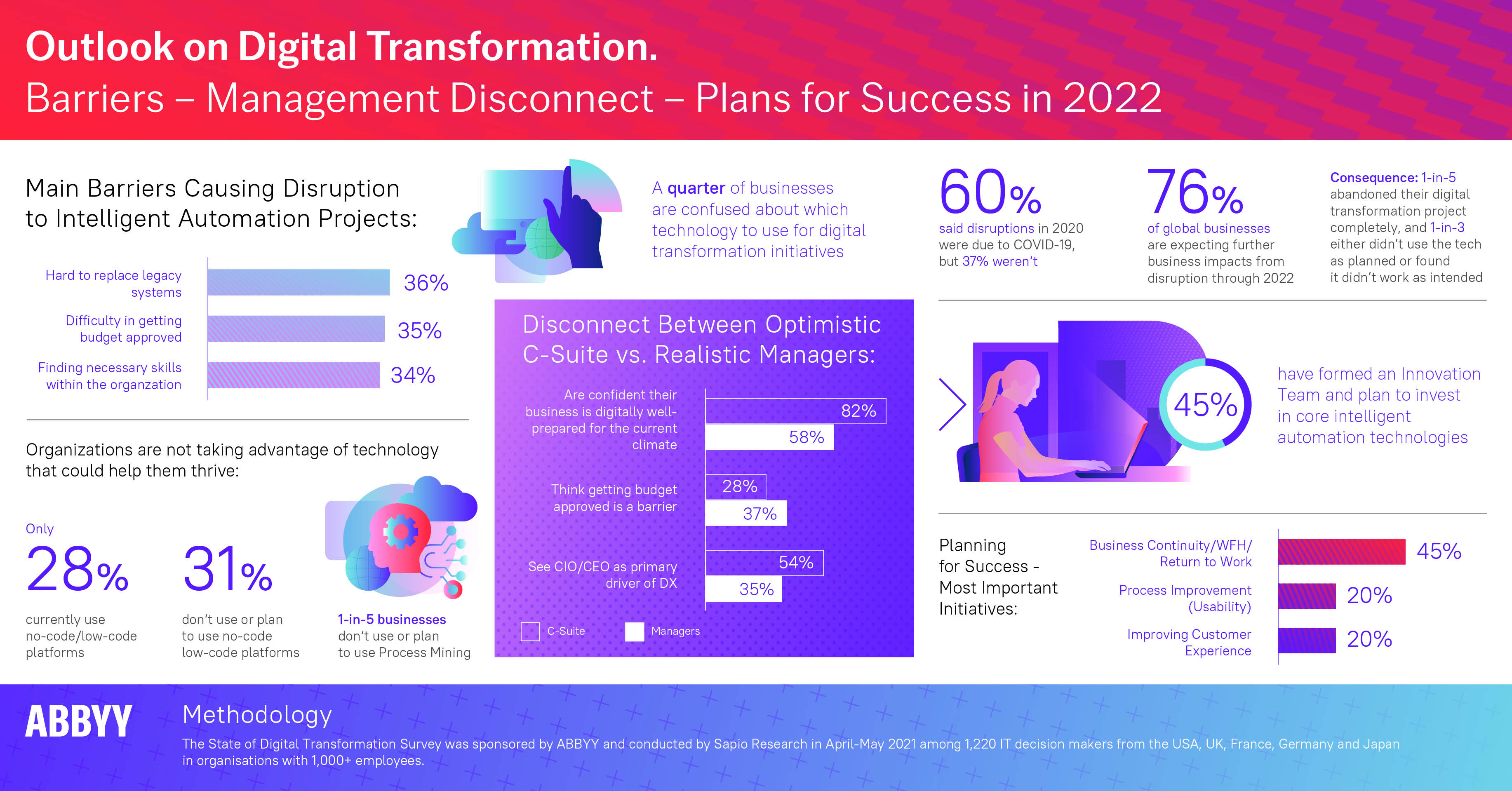C-Suite Threatens Digital Transformation Success as Managers Struggle with Disruptions 2.5x More, according to ABBYY Survey


COVID-19 and remote work not totally at fault for project abandonment or for not working as planned
Four out of five C-level executives (82%) are confident their business is well-prepared digitally, but only 58% of managers agree, according to new global research from Digital Intelligence company ABBYY. This comes as managers say they have been burdened with disruptions to digital transformation (DX) 2.5x more than C-level executives, despite having new technologies on hand. This points to a worrying disconnect within businesses, causing a trend of wasted investments and opportunities.
For example, despite the emerging use of low-code/no-code platforms, only a quarter (24%) of managers use them in their current DX projects, which would empower them to quickly create their own solutions to automation problems and eliminate the need for manual coding. Meanwhile, only 34% of managers are using process mining, which would help them discover automation opportunities and the sources of bottlenecks and delays – but half (48%) of the C-Suite have access to this tech. However, overwhelmingly management across the board (60%+) recognize the importance of intelligent document processing (IDP) technology to digitize and transform enterprise content for more actionable insight.
Figure 1: Global respondents – “Which technologies are you already using in current digital transformation projects?”
While digital transformation has accelerated massively, it hasn’t been without challenges:
- 97% of businesses have experienced disruptions to their DX projects, but surprisingly, only 6-in-10 (60%) say COVID-19 and remote working are to blame. These disruptions have had a massive impact: 1-in-5 abandoned their digital transformation project completely (22%), and 1-in-3 found the technology didn’t work as intended (32%).
- Additionally, decision makers believe these disruptions won’t end as soon as the pandemic does; three-quarters (76%) of global businesses are expecting further business impacts.
When identifying the causes of these challenges, the survey found the following:
- More than a third blamed difficulty in replacing legacy systems (36%), getting budget approved (35%), and skills gaps within their organizations (34%).
- A quarter (23%) said difficulty getting buy-in from their senior management or board was a major barrier.
- What many businesses seem to be experiencing is C-Suite tunnel vision: 54% of C-level execs said they drive DX decision-making, but just 32% of managers agree – half of managers (47%) believe innovation teams are in the driving seat. With this new battleground emerging, it’s no wonder so many projects are failing.
Managers are also far less optimistic about how digitally prepared their organization is compared to the C-Suite, and 38% of managers still face challenges even with new technologies in place, compared to just 16% of C-level executives. Meanwhile, only 28% of C-levels find getting budget approved a barrier, versus 37% of managers.
This disconnect between organizations’ senior leaders and the “doers” is not only failing to empower employees, but it’s preventing businesses from seeing digital transformation success. Simply put, the technology investments that were made by those at the top aren’t having the impact they should, despite 55% of U.S. 2021 DX budgets ranging from $500,000 to $5 million, and 45% expecting their 2022 budgets to increase.
We can see that some C-Suites are experiencing tunnel vision, which comes as no real surprise in a year when survival was top of the agenda. Unfortunately, our research exposed that despite leaders’ best efforts, junior staff and middle managers are still experiencing challenges, even with intelligent automation technologies in place or readily available.
It’s crucial to understand which technologies can improve productivity and where it will have the most impact. The broad use of IDP solutions is the first step in what leaders can do to empower their employees to have faster access to information. However, process mining and the intelligence it delivers will bridge the gap between the reality of what managers and workers are experiencing and what the C-Suite is expecting.
Bruce Orcutt, Senior Vice President of Marketing at ABBYY

Methodology
This research was conducted by Sapio Research during April and May 2021 and sponsored by ABBYY. It surveyed 1,220 IT decision makers across the UK, U.S., France, Germany, and Japan in organizations with 1,000+ employees about the impact of digital transformation projects, the barriers businesses face, and the role that automation technologies play due to the COVID-19 pandemic.
About ABBYY
ABBYY empowers organizations to gain a complete understanding of their business processes and the content that fuels them with its Digital Intelligence platform. ABBYY technologies are used by more than 5,000 companies, including many of the Fortune 500, and is recognized for its leadership in Intelligent Document Processing (IDP) and Process Discovery & Mining for driving significant impact where it matters most: customer experience, effectiveness, profitability, and competitive advantage. ABBYY is a global company with offices in 14 countries. For more information, visit www.abbyy.com/company/about-us/.
ABBYY and the ABBYY Logo are either registered trademarks or trademarks of ABBYY Software Ltd. Other product names mentioned herein may be trademarks and/or registered trademarks of their respective owners and are hereby recognized.
ABBYY editorial contact

